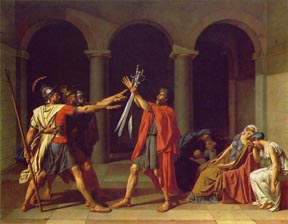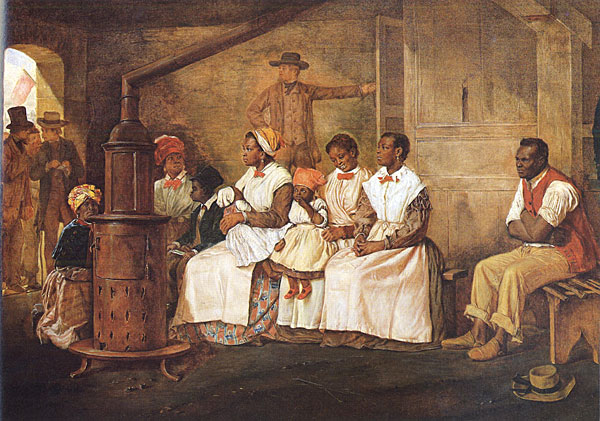| Junior Seminar: Studying History
HY 399--Carol Neel, Block
2,
2013-14
The image to the right is of one of the most
famous and politically significant of the late eighteenth century. Here
the painter-chronicler David portrays an incident from
ancient history of Rome in which three
brothers pledged to defend the Roman Republic with their lives. Is
this painting about the Roman past or David's French present? How
does it represent the commitment of the relationship of the individual
and the state?
How does David here read the past into the present to reframe both the
history of ancient Rome and the politics of modern France?
In this course we will penetrate the picture
plane of historical writing by asking, in a fashion analogous to
interrogation of David's painting, why and how the past has been
differently constructed by various historians, including ourselves.
And look to the bottom of this syllabus for
a challenging visual image of the American past. Of what
is the latter painting of a slave auction in mid-nineteenth-century Virginia trying to convince you? How does the nuance of its representation of African-Americans relate to successive accounts of slavery in the United States?
|

Jacques-Louis David, The oath of the Horatii (1884) |
This course will raise
two questions
central to the activity of all students of the past and all professional
historians: how can we know the past? how can we use that
knowledge?
In exploring possible responses, the course's readings and discussions
will
address the contemporary shape of the historical discipline as well as
earlier
models of historical study. Because "Studying History" is designed
for
history majors--although other students are welcome--students will be
expected
to use their prior experience in historical studies both to contribute
to class
discussions and to evolve their own points of view about history in
general and
individual research projects in particular. In so doing they will
be
entering a historical community widely extended across space and time,
and
including the several groups of HY 399 students still on campus who have
completed this syllabus annually revised by the Colorado College
History Department.
Discussion and discussion outlines
Throughout this exploration of
historiography (that is the relationship between the material of the past and
how we write and think about it) "Studying History" will call upon the active
contribution of all students in reading assigned texts, presenting individual
responses to common readings and establishing connections to outside
readings. The group will proceed as a seminar; the instructor will
endeavor to support discussion rather than lecture. Heavy responsibility
will thus be placed upon all class members to be prepared, to express informed
arguments and to respond attentively to each other's comments. Readings
will generally be discussed on the day for which they are assigned and should
always be completed before that day's meeting. Teams of students will be
assigned to initiate and facilitate each day's conversation. Student-led discussion swill be supported by collaboratively prepared outlines, distributed at the beginning of the relavant class, of the content, critical context, and historiographical significance of the assignment.
Individual projects
By the end of the first week of the course all students will, in consultation with the instructor and other
department members, choose a special topic. Development of this topic will
require the reading of several sources, monographs or articles
embracing sources and criticism on a topic of clear historiographical
interest. In the course of the block each student's research projects will
develop into a substantial paper (4000-5000 words, text and notes); workshops on these
papers will effectively present work in progress to groups of peers.
Papers may treat a wide range of topics, but all will
address the central questions of this course: what, for the historian(s) at
issue, is history for? Why, from her/his/their theoretical perspective and
from the student critic's point of view, should we do history? What
arguments and sources are presented in the historiography? Successful
papers will not narrate events but rather discuss interpretive structures,
setting their respective topics in the context of the course's common discussion
of the background of contemporary historical thought. Further suggestions
for the framing and completion of this major paper are available on the PROWL
website.
Paper prospectus will identify research problems, sources and
conclusions, each offering an annotated bibliography of the primary texts and
scholarly discussions to which students' respective analyses respond.
Outlines will clarify the way the way in which respective students intend to
present historiographical problems, identify scholarly commentary and offer
independent analysis. Papers developing these essential aspects of any
historiographical study will be due at the final breakfast meeting, and will be constructed
according to the standards for style, references and bibliography of the University of Chicago Manual of Style.
Assessment of student work will be
evenly balanced between written work and class participation (seminar
contributions and final oral exam, weighted equally). Students are welcome to consult with the instructor in teh course of the block about their achievement of course standards.
Caution and
exhortation
Completion of this course requires
serious commitment to both common readings and individual research, weighted
equally in final assessment. Engagement in discussion is essential
throughout; leadership assignments will be evaluated as an important part of
seminar participation. Reading assignments are arranged throughout the course's three
and a half weeks for optimal discussion, not for balance of page assignments;
students need to manage time carefully, reading ahead on lengthier and more
difficult works. The paper is due on the last day of the block and it is a
big paper; it will be wise to begin earnest work on it during the first
week. Hence, the instructor has set aside time early on and throughout the
block for students to devote exclusively to paper development.
Sometimes students in Junior
Seminar: HY 399 wish to clarify the relationship between their work in this course and the
other elements of the exit experience (Advanced Seminar/HY 410 and Senior Essay/HY
420 OR Thesis/HY 415. All should be aware that work in "Studying History"
may be connected to those final elements of the major, but that their papers
here are fundamentally different. If students in this class have a clear
idea about their senior research, they are welcome to treat the
research paper here as a bibliographical and historiographical exploration of
their eventual essays'/theses' material. What they write here cannot,
however, be recast as a part or chapter of the final essay/thesis. Here
the questions are chiefly theoretical; in the senior research project, the
central requirement is that the student grapple with primary sources in critical
context. Thus, the conclusions of the HY 399 paper may be a
springboard for further research in HY 410-420/415, but its text may not be recycled
as either an Advanced Seminar paper senior research project.
All work for this course is subject
to the Honor Code; each paper must include a signed statement affirming
compliance.
Required readings
The following works are available for
purchase in the Colorado College Bookstore, and are listed here in order their use in the course:
Herodotus. Histories. Trans. Robin Waterfield. New York: Oxford, 2008. ISBN-10: 0199535663
Graff, Gerald and Cathy Birkenstein, They Say, I Say: The Moves That Matter in Academic Writing. 2nd ed. New York: Norton 2009. ISBN-10: 039393361X
Gerald of Wales. The History and Topography of Ireland. Trans. John O’Meara. New York: Penguin, 1983. ISBN-10: 0140444238
Ibn Khaldun. Muqaddimah: An Introduction to History. Trans. Franz Rosenthal. Abridged ed. Princeton: Princeton UP, 2004. ISBN-10: 0691120544
Marx, Karl and Friedrich Engels. The Communist Manifesto with Related Documents. Ed. John E. Toews. Boston and New York: Bedford/St. Martin’s, 1999. ISBN-10: 0312177118
Clark, Elizabeth A. History, Theory, Text: Historians and the Linguistic Turn. Cambridge MA: Harvard UP, 2004. ISBN-10: 0674015843
All further required readings
are accessible on the PROWL website (https://prowl.coloradocollege.edu/user/view.php?id=24305&course=147)
for this cooperative course. They are:
ON FILM AS NARRATIVE
Rosenstone, Robert A. “History as Images/History in Words: Reflections on the Possibility of Really Putting History onto Film.” American Historical Review 93 (1988): 1773-1185.
Clytus, Radiclani. "Django Unchained: A Review." Common-Place 13 (2013). http://www.common-place.org/interim/reviews/clytus.shtml [accessed September 26, 2013].
ON SLAVERY IN U.S. HISTORY
Phillips, Ulrich B. Phillips, "Plantations with Slave Labor and free, " AHR 30 (1925): 738-753.
Stampp, Kenneth M. “The Historian and Southern Negro Slavery.” AHR 57 (1952): 613-624.
Fields, Barbara Jeanne. “Slavery, Race and Ideology in the United States of America.” New Left Review 1/181 (1990): 95-118.
Ford, Lacy K. “Reconfiguring the Old South: ‘Solving’ the Problem of Slavery.” Journal of American History 95 (2008): 95-122.
ON SHAPES OF TIME AS INTELLECTUAL CONSTRUCTS
Genesis 1-22 (REB).
ON THE IDEA OF NATIONS
Anderson, Benedict. Imagined Communities. London: Verso, 2006. Pp. 9-36.
Wallerstein, Immanuel. “The Construction of Peoplehood: Racism, Nationalism, Ethnicity.” In Wallerstein and Etienne Balibar, Race, Nation, Class: Abiguous Identities. London: Verso: 2010. Pp. 71-85.
ON FEMINIST CRITICISM
Scott, Joan Wallach. “Gender: A Useful Category of Historical Analysis.” AHR 91 (1986): 1053-1075.
Ko, Dorothy. “The Body as Attire: Shifting Meanings of Footbinding in Seventeenth-Century China.” Journal of Women’s History 8 (1997): 8-27.
Bennett, Judith. “Lesbian-Like and the Social History of Lesbianisms.” Journal of the History of Sexuality 9 (2000): 1-24.
ON POSTMODERN THEORY
Bakhtin, Mikhail. Rabelais and His World. Trans. Hélène Iswoldsky. Bloomington: Indiana UP, 1984. Pp. 1-24, 3-58.
Rabelais, François Rabelais. Gargantua and Pantagruel. Trans. M. A. Screech. New York: Penguin, 2008. Pp. 27-29, 129-133.
Bynum, Caroline. “Curriculum Vitae: An Authorial Aide.” Common Knowledge 9 (2003): 1-12.
The following film will be the subject of critical discussion:
Django Unchained, dir. Quentin Tarantino. 2012.
Schedule of class meetings and
assignments
Class will meet at 9:30am in Palmer
217, the Barton Seminar Room,
unless otherwise noted.
Week 1 (September 30)--Organizing
the past
| Monday
Introduction 9am, second 1:00pm meeting |
Discussion: Seeing, believing, and history
Film: Django Unchained |
Reading: Rosenstone, Clytus |
| Tuesday |
Discussion: Slavery as a historiographical problem
|
Reading: Phillips, Stampp, Fields, Ford |
| Wednesday |
Discussion: Ancient paradigms, I |
Reading: Herodotus 1.1-138 (pp. 1-63), 6.1-123 (pp. 353-395) |
Thursday
|
Discussion: Making historiographical arguments |
Reading: Graff and Birkenstein |
| Friday |
Discussion: Ancient
paradigms, II |
Reading: Genesis 1-22 |
Week 2 (October 7)--Finding
historical truth
| Monday |
Discussion: God and
mankind in medieval West
|
Reading: Gerald of Wales; |
| Tuesday |
Discussion: Pattern in historical change, I
Afternoon library session: Research
in historiography (Darryl Alder) |
Reading: Ibn
Khaldun 3-63, 421-431, 459 |
| Wednesday
|
Discussion: Pattern in historical change, II |
Reading: Marx 63-96, 139-149 |
Thursday
No class meeting |
Individual meetings with instructor
Paper
prospectus due 2:30 pm |
Development of paper topics |
| Friday |
Discussion: The nation as the subject of historical analysis |
Reading:
Anderson; Wallerstein |
Week 3 (October 14)--Doing
history/making historiography
| Monday |
Discussion:
Men and not-men |
Reading: Scott; Ko; Bennett |
| Tuesday
|
Paper outlines due 1pm |
Individual meetings with instructor |
Wednesday |
Research topic presentations |
Oral peer criticism and response |
| Thursday
Afternon paper workshops |
Paper drafts (at least 3000 words) due 9:30am in multiple copies
Paper workshops 1 pm |
Written comments toward group critiques |
| Friday |
Discussion: History and theory |
Reading: Bakhtin; Rabelais; Clark 1-28, 63-129 |
Week 4 (October 21)--Doing
history/making historiography
| Monday
Class breakfast 9:30am at 2404 Constellation |
All-class review discussion
Full paper drafts due in class |
Individual review and completion of drafts |
| Tuesday
|
All-class oral examination |
Study groups
Reading toward oral exam: Bynum |
| Wednesday |
Final paper drafts due noon |
Final revision of papers |
The instructor will be available after
class, Monday 3:45-5:00 and Thursday 1-2:30pm (or by appointment) in Palmer 233E for continuing discussion and help with
individual projects. Students may contact Carol at 389-6527 or by e-mail
at cneel@coloradocollege.edu

Eyre Crowe, Slaves Waiting for Sale in Virginia (1856)

